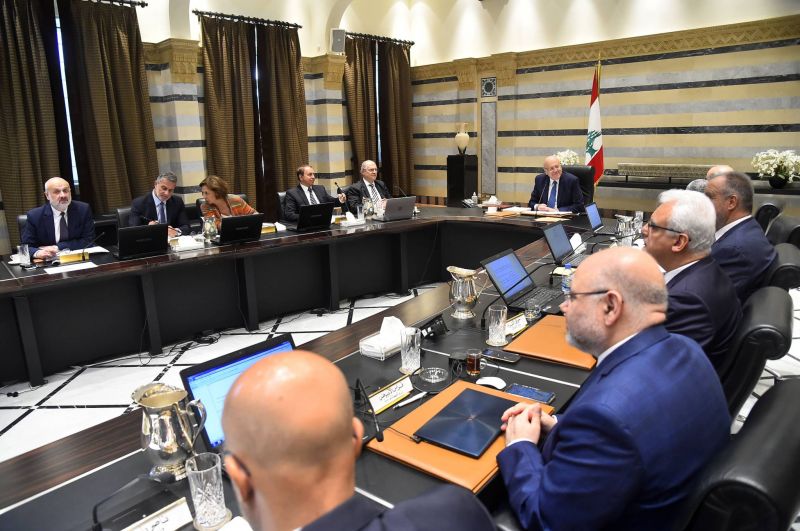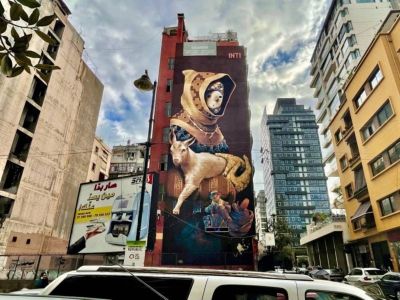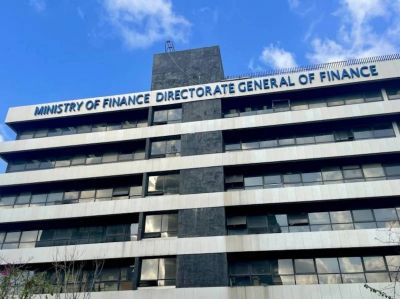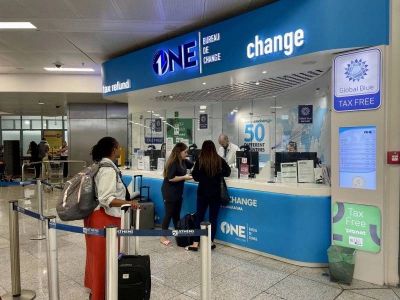
The Lebanese caretaker cabinet meets at the Grand Serail in Beirut, on Sept. 7, 2023 (Credit: Dalati and Nohra)
BEIRUT — With two cabinet meetings on the agenda, one in the morning and the other in the afternoon, Najib Mikati's caretaker government spent hours debating and making decisions.
The second meeting was devoted in particular to examining the preliminary draft budget for 2024, which the Finance Ministry had sent to the executive within the normal timeframe laid down by the constitution and the Public Accounting Code, marking the first time this has been done in years.
According to the caretaker Finance Minister Youssef Khalil, to whom L'Orient-Le Jour spoke, the ministers went through the first 60 articles, i.e. almost all the provisions of the first part, including tax measures.
"There have been no major changes," the minister assured L'Orient-Le Jour, adding that the preamble to the budget, i.e. the introductory text outlining its main principles, would be "ready on Monday."
He also indicated that the exchange rate used to calculate the various taxes would be "the one set by Banque du Liban."
Khalil expressed his satisfaction that the preliminary draft budget had been transmitted to the cabinet "on time," i.e. before Sept. 1, and said he hoped that the government would complete its review and transmit the corresponding bill to Parliament before the autumn session, which starts in the second half of October.
MPs may then have to review and approve two draft budgets at the same time, given that the 2023 budget, approved well outside the deadline last August, has also just been forwarded to them.
Both texts contain numerous tax adjustments to take account of the depreciation of the Lebanese lira, which has plummeted since the start of the country's economic crisis in 2019. Moreover, their content is already being criticized by those who accuse the government of seeking to increase its revenues without offering anything to taxpayers in exchange.
No timetable for the new platform
The government also scored a major coup at its first meeting by approving the replacement of the Sayrafa foreign exchange platform initiated by the Banque du Liban with another instrument, this one operated by the American financial group and economic and financial information agency Bloomberg LP.
This information was announced by caretaker Information Minister Ziad Makary in his press briefing and confirmed by Khalil to L'Orient-Le Jour. The two men did not communicate any timeframe or other details of the BDL project. BDL did not respond to our requests for clarification.
The authorities hope to impose this new platform as the sole reference for the exchange rate between a heavily depreciated Lebanese lira and the dollar, a goal that Sayrafa has never achieved in its three years of existence.
The project to replace the Sayrafa platform had been proposed by BDL's four vice-governors — Wassim Manssouri (first vice-governor), Bachir Yakzan (second), Salim Chahine (third) and Alexandre Moradian (fourth) — at the end of ex-governor Riad Salameh's mandate.
Since then, Manssouri has taken over as interim head of the institution.
The aim of this new platform is to replace Sayrafa, launched by BDL in 2020 in an unsuccessful bid to become the market exchange rate reference, as well as the informal sites and applications that currently relay the exchange rate charged by authorized or illegal agents (such as lirarate.org or Adde dollar).
Sayrafa's mechanism was never clearly explained.
When contacted by L'Orient-Le Jour, the secretary-general of the Association of Banks in Lebanon said that the launch of the new platform was a "positive step" that would enable supply and demand to regain their rights and would help curb the expansion of the cash economy.
A bank executive who wished to remain anonymous told L'Orient-Le Jour he expected BDL to communicate directly with bank managements in the coming days to prepare for the implementation of the new platform.
Between the late 1990s and 2019, BDL stabilized the country's official exchange rate at LL1,507.5 to the dollar by intervening in the market, injecting either dollars or lira. But the situation changed dramatically when the crisis began in the summer of 2019.
Following a long, almost uninterrupted series of annual balance of payment deficits, BDL began to limit its interventions, while banks, also short of dollars, began to illegally restrict their customers' access to their foreign currency deposits.
While the real exchange rate began to stall in 2019, the official rate was maintained for certain specific operations, before other fixed exchange rates were instituted for mechanisms accommodating banking restrictions by allowing depositors to withdraw certain portions of their funds.
Iraqi fuel, tax exemption and air traffic controllers
Furthermore, the caretaker cabinet approved the renewal for a third year of the fuel swap agreement with Iraq to supply EDL (Electricité du Liban), for a total of 1.5 million tons of crude oil. Lebanon, amid the ongoing economic crisis, continues to struggle to meet its fuel needs.
The fuel obtained from Iraq is exchanged for refined fuel suitable for EDL's power plants through third-party operators selected by the Energy Ministry through a bidding process.
Of the quantities of fuel imported under this agreement, 20,000 tons per year will be allocated to the Telecommunications Ministry to facilities operated by Ogero, the public office that manages fixed telephony and internet.
Recruitment of air traffic controllers
Also at Thursday's cabinet session, the recruitment of around 20 candidates who passed the exams to become assistant air traffic controllers in 2018 was approved, following a report in mid-August that identified deficiencies in the safety of air navigation at the Beirut international airport.
A mechanism regarding the refund of VAT (value added tax) by the global leader in tax-free shopping for tourists, Global Blue, was also approved by the cabinet.
A source close to the company explained to L'Orient-Le Jour that the government has accepted the principle of VAT refunds in dollars, but many questions remain unanswered, including the applicable rate. Tax-free shopping is the process of refunding the VAT paid in a country, which is particularly attractive for purchases of high-end or luxury products. Travelers passing through Lebanon — whether Lebanese or foreigners, as long as they do not reside in the country — could therefore recover VAT on certain purchases made within the territory, as is done in other parts of the world.
Lastly, the cabinet approved 91 decrees to reinstate Lebanese nationality to people of Lebanese origin living abroad.
Syrian refugees and school fees
Speaking at the start of the meeting, Mikati returned to the subject of "waves of Syrian refugees" arriving in Lebanon via "informal" border crossings.
He announced that a cabinet meeting would be devoted to this issue next week, adding that it will be held in the presence of the army's commander-in-chief, Gen. Joseph Aoun, and the heads of the various security agencies.
Earlier in the day, the Lebanese Army, which regularly arrests refugees who have entered the country illegally, announced that in one week it had prevented 1,200 Syrians from entering Lebanon by land.
Over the past three weeks, the army has regularly published similar reports on illegal entries into Lebanon, each time reporting several hundred arrests. There are numerous networks of smugglers between Lebanon and Syria. The porous border and the absence of effective state authority in certain regions encourage smuggling and trafficking of all kinds, from drugs to humans.
In addition, Mikati called on his ministers to "assume their responsibilities towards the citizens."
"We are not confiscating power, nor do we want to replace anyone," he added, referring to accusations leveled against him, notably by Christian parties, that he is attempting to arrogate to himself the prerogatives of the head of state given the ongoing presidential vacuum that began when Michel Aoun's term in office ended in October.
On this subject, the caretaker prime minister expressed his support for the initiative of the Parliament Speaker Nabih Berri, who is calling for dialogue in Parliament before the opening of an open electoral session to name Lebanon's next president.
Regarding the start of the new school year, Mikati said he had asked the caretaker Education Minister Abbas Halabi to oblige private schools to "take into account the current economic situation before raising registration fees," in the face of parents' "cries of anger at the increase" in these fees.
He added that a proposal had also been made to increase registration fees in public schools and at the Lebanese University "during discussions on the preliminary draft budget (2024)."


